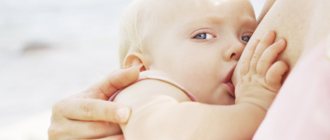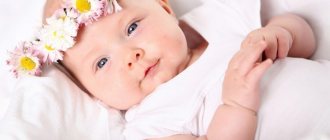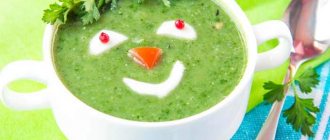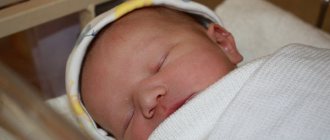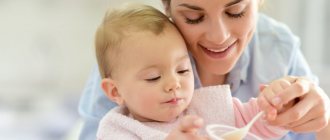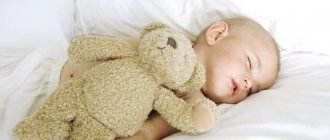As soon as a little person is born, he already needs the most important liquid on planet Earth - water. It is this that creates the conditions for the necessary air humidity, ensures normal growth and development of muscle mass, joints, and internal organs. And even bone tissue contains 50% water. But how do you know how much water a child should drink at 1 year of age, and are there current standards for measuring fluid intake?
In fact, even a newborn baby needs a constant supply of fluid in his body. In some cases, when breastfeeding predominates, children receive everything they need with their mother’s milk. But only up to a certain point. The day is coming when children's water intake begins to be of fundamental importance. And a baby needs more than just breast milk. “Artificial” ones deserve special attention - such babies have to be supplemented with food from an early age, and here it is not only the volume, but also the quality of the drink that matters.
How much liquid should a child drink per day?
To understand whether a child has really started drinking more than the norm, you need to know it.
According to the World Health Organization, the water requirement is calculated based on 30 ml per 1 kg of body weight. So, an adult weighing 75 kg per day should drink at least 2.25 liters of clean water, and most of it - 1.5 liters - in the first half of the day. WHO experts also recommend calculating the amount of water for babies.
More often they think differently: firstly, they take into account all the liquids that the baby drinks, including tea, milk, soups and compotes. Secondly, standards are determined by age - children need to drink more:
- children under 3 years old - 600-800 ml;
- for children from three to seven - 1-1.7 l;
- schoolchildren from 7 years old - from 1.7 to 2 liters.
Teenagers usually drink more: they are actively growing and expending a lot of energy. Therefore, for 12-14 year old schoolchildren, there is no point in asking why your child drinks a lot of water: the reasons are obvious.
Existing standards
How do you know how much water a newborn baby should drink? In most cases, we are talking about compliance of fluid intake with WHO recommendations. Namely, a certain standard has been established for infants under 6 months. Breastfed children need supplemental feeding only in extreme cases - when they lose fluid during illness (diarrhea, elevated body temperature), in the heat. For those who receive artificial nutrition, it is recommended to give up to 150 ml additionally during the day. When solid foods are introduced into the diet, the amount of water in the diet increases. A simple formula will help you calculate the standard yourself. First, the baby’s body weight needs to be multiplied by 50. The resulting number (for example, 8x50 = 400 ml) will be needed for further calculations. Next, the amount of liquid nutrition consumed by the baby is taken into account. Multiply 300 ml of milk, soup, mixture by a factor of 0.75. The resulting number is 225 ml, subtracted from the previously obtained amount of 400 ml. The difference will correspond to the volume of additional soldering.
Everything is clear with babies, but how much water should a child drink at 2 years old? On average, consumption volumes can reach from 800 to 1500 ml, depending on the baby’s activity and external temperature. Consider everything your baby consumes: soup, tea, juices. It is possible that he drinks a small amount of water due to the fact that he replenishes fluid losses by other means.
How much water should a 5 month old baby drink if the summer heat threatens him with heatstroke? Even a baby in this situation can be offered about 50 - 100 ml, and for bottle-fed children this volume can be increased. Accordingly, you can decide how much water a child should drink at 8 months.
Schoolchildren of primary and secondary classes are equal to adults in terms of consumption standards.
Why does the need for water increase in children?
Parents often get scared when their baby or three-year-old suddenly starts drinking a lot of water. But there are reasons why a child often drinks water:
- An infant may require a lot of water if you have started complementary feeding: the level of salt in food changes, the baby is thirsty.
- If the formula (baby food) is sweeter than breast milk, then it will also need more water.
- Often giving juice is also not a good idea, because it contains sugar, and the consumption of sweets (as well as salty) causes thirst even in adults (what can we say about little ones, whose metabolic processes occur much faster).
- Fatty, dry foods increase the need for water. After such food, give your child plenty of water so that it develops normally. By the way, pay attention to how the child behaves after breastfeeding: mother’s milk may be fatty, and the baby will want to drink. It’s easy to check: give him water; if he refuses, it means he doesn’t need it. As Dr. Komarovsky notes, children drink as much water as they need.
- Living in a hot, stuffy room, a lot of clothes, dry air - these are some more reasons why a child often drinks water. To avoid this, Komarovsky recommends that the temperature in the house be 18-20 degrees Celsius. It is important to monitor humidity.
- Physically active babies (even at the age of 1 month) will want to drink a lot: due to their mobility, their body becomes dehydrated earlier.
How much should a baby eat at 8 months?
The daily food intake for an eight-month-old baby (both artificial and infant) is 1 liter. With five meals a day, the baby receives about 200 ml at a time. The first and last daily feedings must consist of breast milk or an adapted formula in a volume of 200 ml (the baby, of course, chooses his own norm). Complementary feeding dishes should also be offered in a volume of about 200 ml, including liquids.
However, these are only average indicators. Many children are not able to eat that much food at one time. Especially when it comes to infants who nurse throughout the day. Focus on your baby: if he is gaining weight well, is not capricious, but eats less than normal, then everything is fine. The problem becomes a small child who refuses complementary feeding altogether. We will talk about such children in the next chapter.
Reasons for drinking too much water
May be psychological:
- The child is used to walking around with a bottle and constantly drinking; if it is taken away, he begins to cry and ask for the drink back. In this case, it is enough to wean your baby from carrying a bottle with you (for example, do not fill it, but let him drink from a glass) and the problem will be solved.
- Children, especially those weaned early, feel the need to suck. If parents do not provide a pacifier, the baby tries to “catch up” by using a bottle.
- Lack of parental attention can also provoke the baby to drink more liquid. This may explain why the child drinks a lot of water at night: the baby simply does not want to let mom and dad leave him, so he asks for a drink. It’s good to replace drinking with socializing - for example, reading a bedtime story.
- Often he simply does not want to go to sleep and simply delays going to bed. But since children need sleep, you need to come up with rituals that make bedtime easier.
- Stress can also provoke excessive thirst: new people in the house, kindergarten, or some other serious change in the usual way of life - the baby becomes a water drinker.
It is important to remember that the desire to drink water is normal. And if the baby drinks exclusively compotes and juices and refuses water, re-teach them: the baby likes their taste and simply enjoys it. At the same time (remember WHO recommendations) he still doesn’t get enough water.
It happens that children drink a lot of water because they are sick.
What to do if there are signs of illness?
Young children often get sick. A newborn baby, as a rule, lives off the mother’s immunity, since he suckles at her breast, and is therefore less susceptible to diseases (if breastfeeding has stopped or has not started at all, then the baby’s immunity is weaker and should be protected, otherwise he may get sick often).
In fact, the incidence of illness is influenced by the state of the baby’s immunity: in “natural” children it is, as a rule, higher, and in “artificial” children it is lower. This is due to the quality of nutrition: if the body receives all the nutrients it needs for development, it is better able to resist diseases. And, although there is a lot of high-quality baby food on the market, you need to be able to use it correctly, otherwise the baby may get sick, the fluid balance in his body will be disrupted and he will have an increased thirst for drinking.
Diseases that can cause attacks of thirst:
- problems with the gallbladder and liver can cause bitterness in the child’s mouth - and he will drink water to get rid of it;
- a baby who drinks a lot may have a stomach ache - due to impaired kidney function, in this case there are additional signs of illness (fever, swelling in the legs or face, weakness and pallor);
- diabetes: there are two of them - sugar and non-sugar. The first is a serious illness that is easy to recognize: the child drinks a lot and pees, he is weak, drowsy, gets tired quickly, sweats excessively, constantly itches (itching) and loses weight (but not appetite!), wounds arise (scratches, cuts, etc.) etc.) heal poorly. And diabetes insipidus is associated with a lack of hormones produced by the pituitary gland, while simultaneously increasing the number of trips to the toilet;
- parasites: if, along with thirst, the child suffers from nausea (he may simply burp or at times will vomit), abdominal pain, changes in mood, appetite and stool, as well as itching in the anus, then most likely he is infected with worms - you need to get tested tests.
Remember: If symptoms appear, consult a doctor. The specialist will decide what tests need to be carried out and, if necessary, prescribe treatment. Before visiting a pediatrician, you need to observe your child - this will help to make a correct diagnosis.
What to look for:
- How many times does the baby go to the toilet?
- Characteristics of urine: color, smell, quantity.
- What kind of stool does the baby have? How often?
- Does the child sweat, how much, and what does the sweat smell like?
- Has his behavior changed when resting or being active?
It is recommended to record the results of observations in order to later have accurate empirical data.
How to regulate the amount of water consumed
The easiest way is to follow WHO recommendations and give your children water yourself. Kids often forget to drink on time, getting too excited, and then consume several glasses of water at once. This is not good: the stomach increases in volume from the ingestion of liquid, which causes discomfort to the child, and then prevents him from eating normally: there is not enough food, or, on the contrary, the baby cannot stop.
Therefore, you need to act like this: if you have introduced complementary foods, be sure to give them something to drink before meals. Not after! Water destroys fermentation and the child’s body will poorly absorb what he eats, which will adversely affect his health. A glass of water before a meal will relieve thirst after it, especially if the food is salty.
It is necessary to keep water available for the baby: if the child is able to pour a glass for himself, you can get by with a household cooler. Let your favorite drinking bottle be in plain sight!
Make sure the water is fresh and clean. Leftover food in the drinking bowl contaminates the water and creates a breeding ground for bacteria. Therefore, maintain hygiene!
The next way is temperature: keep the house at 18-20 degrees and regularly ventilate the room so that the air is clean and has normal humidity. Then the need for water will decrease.
What kind of water can be given to a child - basic requirements for baby water
But not all water is healthy. The water that comes out of the water supply may contain various bacteria, radionuclides, heavy metals and other substances that are toxic and harmful to adults, and especially to children. She can't give small children anything to drink!
Parents have two options:
- Or install a deep cleaning filter.
- Or use bottled water for children's drinks and soups that meets all sanitary rules and regulations.
But it is not recommended to boil water, since heat treatment completely kills not only harmful microbes in it, but also beneficial microelements.
According to SanPiN 2.1.4.1116-02, baby water must be enriched:
- Potassium
(up to 0.02 g/l). - Calcium
(up to 0.08 g/l). - Iodide ion
(up to 0.06 mg/l). - Fluoride ion
(up to 0.7 mg/l). - Magnesium
(up to 0.05 mg/l). - But
there should be no silver
Total mineral substances in water for children should contain no less than 250 and no more than 500 mg/l. Such water should be no harder than 7 mEq/l, with an alkali content of no more than 5 mEq/l.
The name of the water on the label must necessarily contain the word “children’s” or “for children”, and it must comply with the requirements of the legislation of the Russian Federation.
The manufacturer must also have the following documents:
- Certificate
of state registration of Rospotrebnadzor. - Certificate
of conformity of the brand for water. - Declaration of
conformity of the brand for water. - Declaration
confirming the product’s compliance with the requirements of the Customs Union prescribed in the technical regulations.
There are two types of baby water on sale:
- Drinking water.
- Water for cooking.
Preparing artificial nutrition for a baby using drinking water is not recommended, due to the content of minerals and trace elements in the liquid that can upset the balance of the mixture.
It is advisable to give children only bottled water that is extracted from deep artesian wells in ecologically clean areas, and which is additionally passed through a filter.
To avoid accidentally purchasing low-quality water, carefully read the information on the label in small print. It should also indicate the age at which you can drink this water and its shelf life.
Recommendations for food and fluid balance
Here, too, everything is simple: you need to reduce the amount of fatty, overly dry and salty foods in the child’s diet, remove sweets from it (or reduce its consumption), including drinks (juices, compotes, lemonades, tea with sugar, cocoa). If your baby is already used to juices, dilute them with water. It’s better to do it right from the very beginning of complementary feeding.
Guys can be water drinkers for various reasons. And only some of them are symptoms of diseases. Everything will be fine with the baby if he is fed and watered correctly, provided with normal living conditions and - loved. Trying to get our love and attention, kids often become capricious, sometimes running to the toilet at night. So their health is in the hands of their parents.

